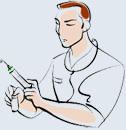The Swedish researchers Vini G. Khurana, Lennart Hardell, Joris Everaret, Alicja Bortkiewicz, Michael Carlberg and Mikko Ahonen have analyzed the growing public exposure to radio frequency and microwave radiation emitted by wireless communications technology, including cell phones and associated repeater stations to investigate possible adverse health effects.
They analyzed all the scientific studies on this topic, using the PubMed search engine, thus identifying a total of 10 epidemiological studies on the effects of masts on health. Seven of these publications explore the correlation between proximity to base stations, repeaters and neuro-behavioral effects, while three other publications investigating the effect on cancer.
gurppo The research has thus discovered that eight of the 10 studies reported an increased prevalence of increased neuro-behavioral symptoms of cancer or in those who live less than 500 meters from the repeaters.
None of the studies had found levels of electromagnetic fields higher than those considered safe by international standards, suggesting that these standards may be insufficient to protect public health and the need to lower the exposure limits.
The researchers, who published the results of their study on ' International Journal of Occupational and Environmental Health (Vol 16, No 3, 2010), believe that studies are necessary Epidemiological assess the long-term effects of exposure to mobile phone masts, in order to have an urgent and more defined understanding of their impact on health.

